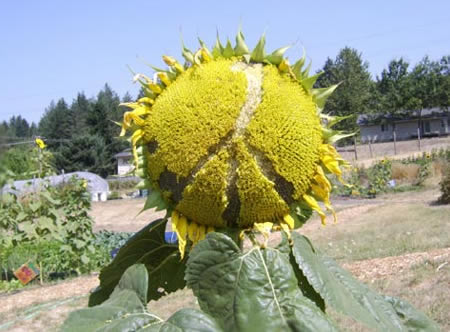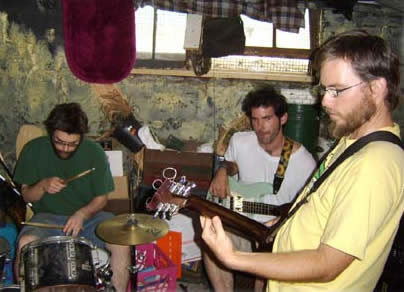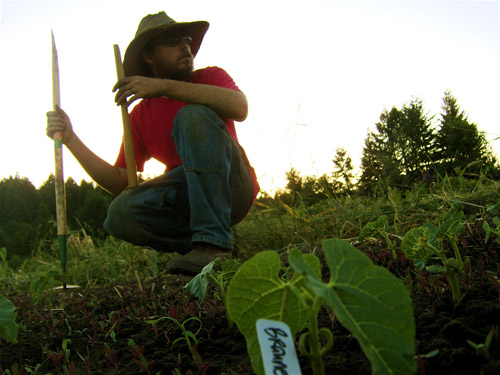Andrew Still's Bio...
The following is an account of my seed related past and a bit more thrown in.
As I type Sarah and I are farming at Hayhurst Valley Organic Farm and Nursery in Yoncalla, Oregon. This seems an ideal situation for us because we get to grow vegetables, have an income, and do seed ambassadors stuff in the spare time. This seed ambassadors stuff entails seed growouts and trials, workshops, events, seed swaps, recruiting other seedy people, website updating, and studying. Lets just say it is a challenge to work on the project while primarily growing things for the market (Kayla you should know what I mean), But it is still an ideal situation. Thanks to the farm owners, Richard and Kate Wilen, we have been gifted the opportunity to work for them and have all the extras we need (like a place to live and space for seed growing) thrown in too. Things are exhaustingly busy but quite good.
Now on to the historical stuff (which should be more self effacing than it is).
I had always found joy in the natural world and when young I always found myself hiking, backpacking and camping. I grew up constantly observing and thinking about Nature and this is what lead me to my volunteer work with the Leadership Education Adventure Program (LEAP) while I was attending Humboldt State University in Arcata California. Outdoor adventure and environmental education with less privileged youth was LEAP's thing. This is where I first discovered my knack for and enjoyment of teaching. I found early on that I favored the facilitory roll to the authoritarian one. Preferring to collaborate in the process of my and others educations. While with LEAP leading trips in backpacking, rock climbing, river rafting, challenge courses and leadership trainings, I meet my wife and co-conspirator Sarah.

Somewhere along the line I decided that I was having too much fun. For my paradigm to remain uncorrupted, I and my new found partner needed a change of scene. By this time I had been exposed to a strange confluence of natural food stores, farmers markets, bicycle transportation, appropriate technology classes, and few hippie friends bringing their CSA share to my house for dinner. I think it is Joshie and Able that must be credited for the initial taste of my, soon to be, primary direction in life. This simple idea of bringing home a sack full of local organic produce each week and investing money in a farm so they could give you what they could grow, was a hugely important idea to me and still is to this day. The Arcata Educational Farm and it's Community Supported Agriculture Program was where the food was coming from and for a little while I volunteered some time there, while reading subversive literature by Rudolf Steiner and Wendell Berry.
Sarah had recently graduated from HSU and with new seeds of alternative agriculture, local sustainability and a higher wisdom planted in my head, I quickly dropped out of the University. We first dug ourselves into the sandy loam of the production oriented Willow Creek Farms in Willow Creek California
At this juncture I acquired the Book Seed to Seed by Suzanne Ashworth. The idea of seed saving was already interesting to me, but this book sent me flying deep into it and gave me a specific direction to lay most of my focus. With its detailed information on seed saving of many vegetable species, I feel that this book is one of the most important books ever written. Considering how our culture has lost most of this knowledge, I recommend this book to all beginning and experienced people of a sustainable world view.
The first place we looked to find another farm to work on was at the Appropriate Technology Transfer For Rural Areas (ATTRA). There we found a country wide list of apprenticeships on organic farms. With a refined list of many of the interesting farms in the pacific northwest, Sarah and I took a road trip and visited many of them and found the one we liked best. This was Horton Road Organics, ½ hour outside of Eugene Oregon. But before we planted ourselves on Oregon, We traveled to Thailand for the winter.
In Thailand we helped a village construct a community Hall and a few other buildings out of Cobb and Adobe. While in this village I spent some time studying Permaculture with our friend Loong Yoot, A Thai man with extensive Permaculture training, and also started a small community garden near their new hand dug well. Consequently, this was my first experience collecting seed from another country.
Back in the country, we bounced straight into the routine at Horton Road Organics, one of the swellest organic farm ever. There Debra Seido Martin and Bill Booth run a five acre CSA and Market farm. With the smoothest soil and an excess of skill, they produce some of the highest quality produce, while running a great apprenticeship program. Here we learned everything we needed to know about how to successfully run an organic farm.
While wrestling through field work and farmers markets, I came across some other serious influences upon me.
• Gene Logsdon - The Contrary Farmer - Helped me to re-justified my decision to drop out of school and find a more efficient form of education, while encouraging me to work for a more sustainable agriculture.
• Carol Deppe - Breed Your Own Vegetable Varieties - This book sparked my interest in breeding and the pursuit of organically adapted crop varieties. It is a great resource for anyone who wants to really understand or improve seeds.
• The Garden Seed Inventory - Published by the Seed Savers Exchange, it helped (and still helps) me understand some of the varietal possibilities that are left out there and what needs to be saves from oblivion.
•Cary Fowler and Pat Mooney - Shattering: Food, Politics, and the Loss of Genetic Diversity, shows how drastically important the current loss of agricultural genetic diversity is and the politics behind it |
Some interesting people I was exposed to around that time have made a great impact me.
• Frank Morton of Wild Garden Seeds got me thinking about growing seed commercially in the Pacific Northwest. He has developed and improved so much significant germplasm that we would definitely be on our way to a more sustainable system if every bioregion in the world had a hundred people like him around.
• Helping with Seed trials facilitated by Macaela Colly of Seeds Of Change (now with the Organic Seed Alliance), Showed me some of the practical characteristics of to look for in varieties of seeds and some variety trialing methods.
• Seeing Don Tipping's Seven Seeds Farm in Williams Oregon convinced me that I had to get deep into the seed scene and possibly start a seed growing and breeding farm myself. His diverse collection of amazing projects and crops inspired me to see that there is so much more possible than I ever imagined.
Next I was off to the Laurel Valley Educational farm at Northwest Youth Corps. I found myself to be very luck to be able to farm on someone else’s dime, not that they gave me many dimes. But I had the land, the labor (in the form of middle School youth), and just enough infastructure to work with. NYC is where I was able to first test my chops.

In April of 2005 Nick and I attended a workshop by Carol Deppe titled "Seeds for Survival". It was held at Sunbow Farm in Philomath, OR. This workshop summed up Carol’s thought on sustainability and Local survival through times.
Around this time I began doing some serious seed breading and crossing varieties to make wild mixes or Grexes. By selecting the most appropriate available cultivars for our area and crossing them into working composite varieties, my goal is to create new Land Races that are more resilient, disease resistant and highly capable in our bioregion. These are also great gene pools to pull interesting pedigree varieties out of to satisfy particular applications and niches.
Recently some of the Books that I have found groundbreaking for me have been…
• Gary Paul Nabhan – Enduring Seeds – Many Fascinating accounts of the importance of our genetic resources and some of the attempts at saving it.
• Raul Robinson - Return To Resistance – Explains the concept of horizontal resistances in plants and how we can use this to cast off our dependency on chemical agriculture. More importantly, it helps us to think about Plant genetics in a more holistic way.
• Wolf D. Strol - Culture and Horticulture: A philosophy of gardening – A fantastic reference and introduction to the Biodynamic method. It beautifully integrates holistic and mystic philosophies with practical methods of gardening and farming.
• Elliot Coleman - Four Season Harvest – Some of the best information on growing with all the seasons and feeding yourself year round.
• Rudolf Steiner – Nature's Open Secret – This is an introduction to Goethe's scientific writings written by Steiner. Goethe is possibly one of the most important influences on the holistic paradigm. It is great to read Steiner's thoughts on Goethe and it is not nearly as "cryptic Anthroposophical" as one might think. |
There seems to be a severe lack of information regarding kales. In particular, Russian and Siberian type kales. These kales are fairly new to us in the U.S. of A. and are gaining in popularity. I have been collecting as much information from as many different sources about these "napus" kales and I have tried to prepare a treatise on these kales. I feel that they might be a serious asset to our survival and sustainability. I may be spending too much time thinking about kale because Sarah is starting to tell everyone that I am an obsessed Kale geek.
Winter Gardening has always been of interest to me. It seems to me to be an obvious aspect of sustainability in the pacific Northwest. So I got excited when Nick organized a winter gardening workshop. I assisted in small ways in the workshops material, but mostly it got my mind focused on yet another fascinating and important side road to our appropriate survival.
I have begun to explore the new foundational developments of a collection of paradigms that are emerging all around us. Ideally they may carry us out of our current state of alienation and I have found some seeds in the writings of Goethe, Rudolf Steiner and many others. Their ideas of holistic thought and practice hold some truths that may help us ascend from our destructive tendencies. I have found the use of the reductionist mentality of breaking the Whole down to its discovered parts, to be acutely flawed. These flaws of reason, I think, encourage the fear and the power struggles that have kept us from a greater balance, humility and beauty.
The increasing possibility of the collapse of our civilization and the current downturn of American political culture have motivated me harshly to continue my pursuit for the sake of balancing world culture and world ecology. Now that we have encouraged so much destruction we must prevent it from all going down the drain.
The strengthening of our nourishment on many levels may help us on many levels. When asked why we have not been able to achieve our greater potential as a culture, Rudolf Steiner responded that we must have greater nutrition to achieve this. This may be the key to overcoming the darker gulf of our ignorance and I hope that seeds can be the form for this foundation.
Better seeds - for better food – for better nutrition – to better all of our pursuits.


